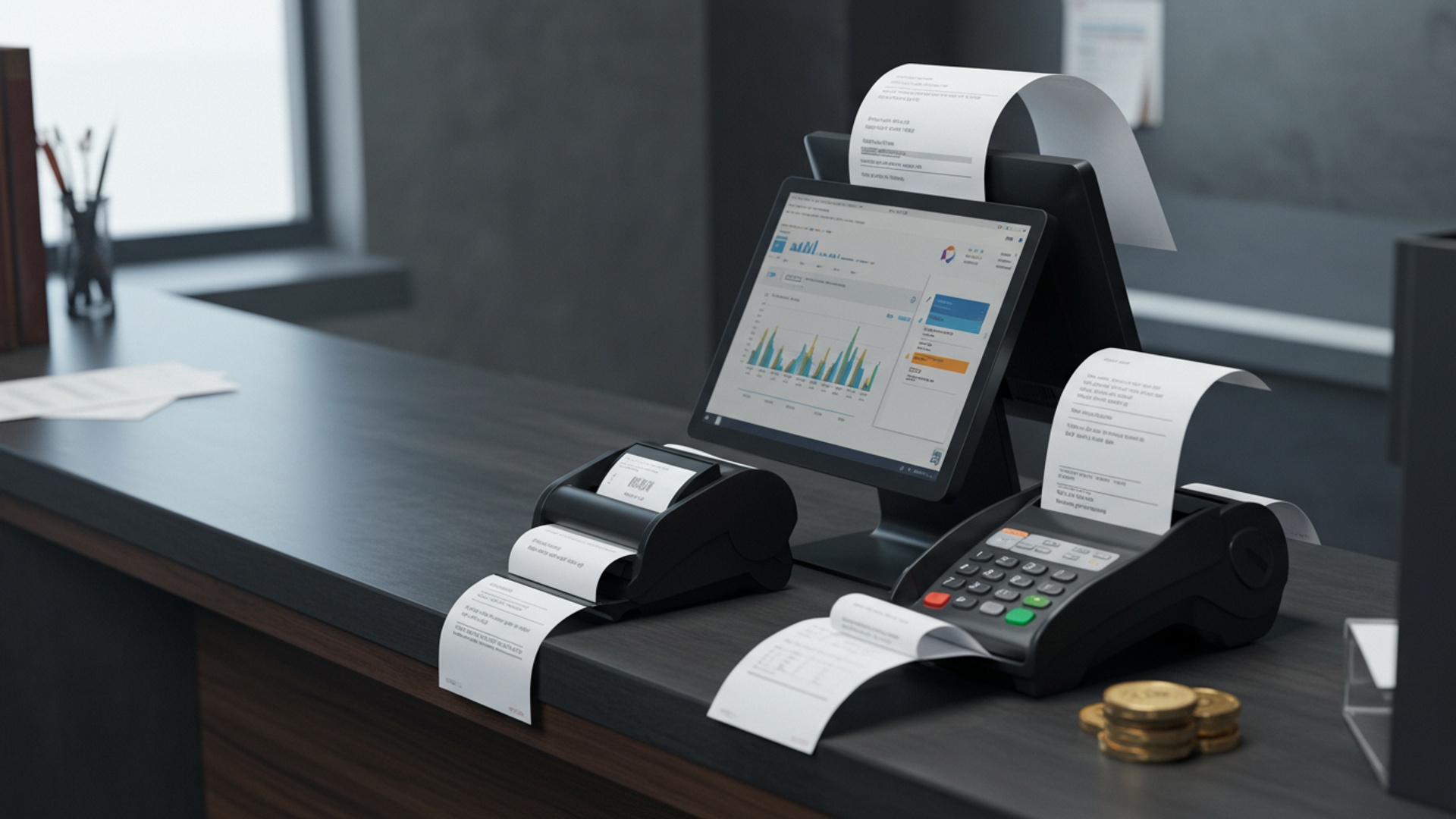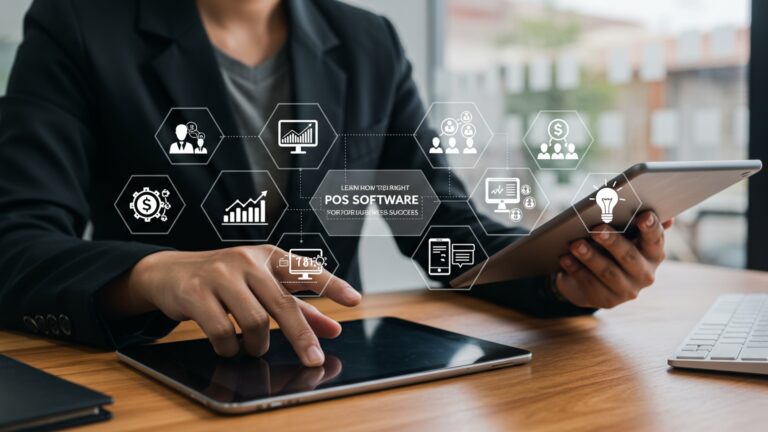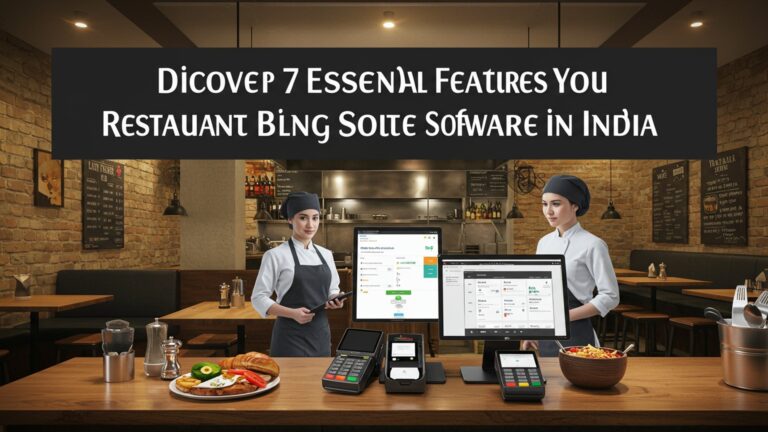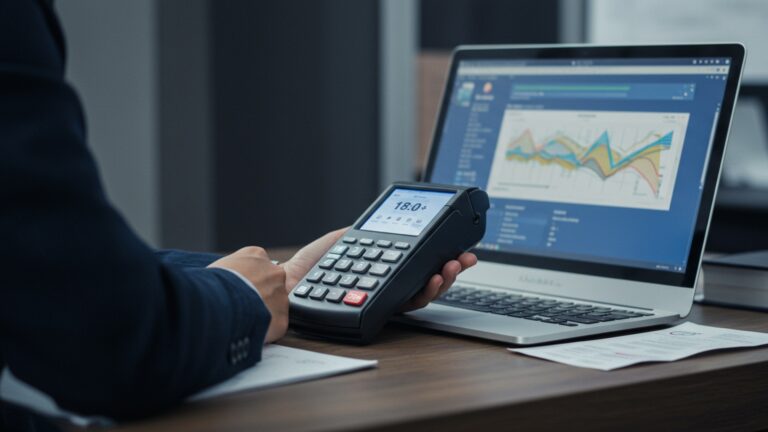How to Streamline Your Billing with Effective POS Billing Software Solutions
- pos billing software
- pos billing software

The Core Problem: Billing Headaches in Modern Business
In today’s fast-paced commercial landscape, businesses, regardless of their size or industry, often grapple with the complexities of managing their financial transactions. Traditional billing methods—relying on manual entries, paper invoices, or disparate systems—are notorious for creating bottlenecks. These inefficiencies don’t just slow down operations; they introduce a higher risk of human error, leading to inaccurate records, frustrated customers. ultimately, a negative impact on the bottom line.
Imagine a bustling retail store during a holiday rush, where long queues form due to slow checkout processes, or a restaurant struggling to reconcile daily sales with inventory after a busy dinner service. These scenarios highlight the critical need for a robust, integrated solution that can transform the billing process from a source of stress into a streamlined, efficient operation. This is precisely where modern Point of Sale (POS) billing software comes into play, offering a comprehensive remedy to these common business challenges.
Decoding POS Billing Software: What It Is and Why It Matters
At its heart, a Point of Sale (POS) system is the place where a customer makes a payment for products or services. More broadly, it encompasses the hardware and software that facilitate and record these transactions. When we talk about pos billing software, we are specifically referring to the sophisticated application that runs on this system, designed to manage all aspects of sales transactions, from item selection and pricing to payment processing and receipt generation.
Beyond simply ringing up sales, modern pos billing software acts as the central nervous system for many business operations. It’s an integrated platform that handles:
- Transaction Processing
- Payment Management
- Inventory Tracking
- Customer Data Management
- Reporting and Analytics
Quickly and accurately processes sales, returns. exchanges.
Integrates with various payment gateways to accept credit cards, debit cards, mobile payments. more.
Automatically updates stock levels as items are sold, helping businesses manage their inventory in real-time.
Stores customer insights, purchase history. loyalty program details.
Generates detailed reports on sales, profits, inventory. employee performance.
The significance of effective pos billing software cannot be overstated. It moves businesses beyond mere transaction recording, offering powerful tools for operational efficiency, data-driven decision-making. enhanced customer experiences. For any business looking to thrive in a competitive market, understanding and leveraging this technology is no longer optional—it’s essential.
The Pillars of Streamlined Billing: How POS Billing Software Transforms Operations
Implementing effective pos billing software is akin to installing a high-performance engine in your business operations. It fundamentally redefines how transactions are managed, bringing about a multitude of benefits that directly contribute to efficiency and profitability.
- Accuracy and Error Reduction
- Speed and Efficiency
- Integrated Inventory Management
- Enhanced Customer Relationship Management (CRM) & Loyalty Programs
- Comprehensive Reporting and Analytics
- Versatile Payment Processing
- Security and Compliance
Manual data entry is a prime source of errors, leading to discrepancies in pricing, inventory counts. financial records. POS billing software automates these processes, ensuring that prices are pulled directly from the system, discounts are applied correctly. sales are accurately recorded. This precision minimizes costly mistakes and ensures reliable financial reporting.
Time is money, especially in retail and hospitality. A modern pos billing software dramatically speeds up checkout times. Cashiers can quickly scan items, apply promotions. process payments, reducing customer wait times and increasing throughput. This efficiency directly translates to higher customer satisfaction and the ability to serve more customers during peak hours.
One of the most powerful features of advanced pos billing software is its seamless integration with inventory management. Every sale automatically updates stock levels, providing real-time visibility into what’s in stock, what’s selling fast. what needs reordering. This prevents stockouts, reduces overstocking. optimizes purchasing decisions, saving significant capital and storage costs.
Modern pos billing software often includes robust CRM capabilities. It allows businesses to collect customer data, track purchase history. manage loyalty programs with ease. This data enables personalized marketing efforts, targeted promotions. a deeper understanding of customer preferences, fostering stronger customer relationships and repeat business. For example, a small coffee shop owner, Sarah, noticed a significant increase in returning customers after implementing a loyalty program through her new pos billing software, offering a free coffee after every ten purchases. The system automatically tracked points, making it effortless for both her and her customers.
Beyond just recording sales, effective pos billing software provides powerful analytical tools. Businesses can generate detailed reports on sales trends, product performance, employee productivity. peak transaction times. These insights are invaluable for making informed decisions about staffing, marketing strategies, product assortment. overall business growth.
Today’s customers expect a variety of payment options. Advanced pos billing software supports multiple payment methods, including EMV chip cards, contactless payments (NFC), mobile wallets (Apple Pay, Google Pay). traditional cash. This flexibility enhances the customer experience and ensures no sale is lost due to limited payment options.
Protecting sensitive customer and business data is paramount. Reputable pos billing software solutions are built with security in mind, offering features like data encryption, user access controls. compliance with industry standards (e. g. , PCI DSS for payment processing). This safeguards against fraud and ensures regulatory adherence.
Key Features to Look for in an Effective POS Billing Software Solution
Choosing the right pos billing software is a critical decision that can significantly impact your business’s operational efficiency and growth. When evaluating options, consider the following essential features:
- Intuitive User Interface (UI)
- Scalability
- Cloud-Based vs. On-Premise
- Cloud-Based POS Billing Software
- On-Premise POS Billing Software
- Robust Integration Capabilities
- Customization Options
- Reliable Customer Support
- Mobile POS Capabilities
The software should be easy to learn and use for your staff, minimizing training time and reducing errors. A clean, logical interface ensures quick checkouts and smooth operations, even for new employees.
Your business will grow. your software should be able to grow with it. Look for a solution that can handle an increasing volume of transactions, additional users. new locations without requiring a complete system overhaul.
This type of software stores data remotely on cloud servers. It offers significant advantages such as accessibility from anywhere with an internet connection, automatic updates, lower upfront hardware costs. enhanced data security through offsite backups. It typically operates on a subscription model (SaaS).
This software is installed directly on your local servers and computers. It offers full control over your data and system. typically involves a one-time license fee. But, it requires local IT management, manual updates. can be less flexible for remote access.
For most modern businesses, especially those seeking flexibility and lower maintenance, cloud-based solutions are often preferred due to their inherent scalability and ease of management.
The true power of pos billing software often lies in its ability to integrate with other business tools. Essential integrations include accounting software (e. g. , QuickBooks, Xero), e-commerce platforms (e. g. , Shopify, WooCommerce), CRM systems. marketing automation tools. Seamless data flow between these systems eliminates manual data entry and provides a holistic view of your business.
Every business is unique. The software should offer a degree of customization, allowing you to tailor product categories, loyalty programs, receipt templates. reporting dashboards to fit your specific needs.
When technical issues arise, prompt and effective support is crucial. Look for vendors offering multiple support channels (phone, email, chat) and a strong reputation for responsiveness and problem-solving.
For businesses that operate on the go, at pop-up shops, or require tableside ordering, mobile pos billing software (often running on tablets or smartphones) is invaluable. This offers flexibility and enhances customer service by bringing the checkout experience directly to the customer.
Real-World Impact: Case Studies and Use Cases
The practical benefits of effective pos billing software are evident across a multitude of industries. Here are a few examples illustrating its real-world impact:
- Retail Boutique
- Café and Bakery
- Service-Based Business (Salon)
Consider “Fashion Forward,” a small clothing boutique that previously relied on a traditional cash register and manual inventory sheets. Errors in pricing were common. reconciling daily sales with stock took hours. After adopting a cloud-based pos billing software, Fashion Forward saw a dramatic improvement. The system automatically adjusted inventory with each sale, provided real-time sales data. integrated with their accounting software. Owner Maria noted, “Before, I spent my evenings dreading the bookkeeping. Now, with the new pos billing software, I can see my best-selling items, manage returns effortlessly. even track customer preferences to send targeted promotions. It’s transformed how I run my shop and given me back precious time.”
“The Daily Grind,” a busy local café, struggled with long queues during morning rushes and difficulty managing their rotating menu of baked goods. Their new pos billing software, equipped with a kitchen display system (KDS), streamlined order taking and preparation. Orders placed at the counter instantly appeared on a screen in the kitchen, reducing miscommunications and speeding up service. The software also helped them track ingredient usage, allowing them to minimize waste and optimize their popular items. Their customer satisfaction scores improved significantly due to faster service.
“Glamour & Go,” a hair salon, used to manage appointments, client records. payments separately. This led to double bookings and lost client histories. By implementing a specialized pos billing software designed for salons, they integrated appointment scheduling, client profiles (including service history and product preferences). payment processing. Now, stylists can quickly access client notes, recommend products based on past purchases. check out clients seamlessly. The integrated system also allowed them to introduce a loyalty program, rewarding repeat clients, which boosted customer retention.
These examples underscore how the right pos billing software isn’t just a tool for processing payments; it’s a strategic asset that drives efficiency, improves customer experience. provides crucial insights for business growth.
Implementing Your POS Billing Software: Best Practices for Success
Adopting new pos billing software is a significant step. a well-planned implementation ensures a smooth transition and maximizes the return on your investment. Follow these best practices for a successful rollout:
- Thorough Assessment and Planning
- Strategic Vendor Selection
- Comprehensive Staff Training
- Accurate Data Migration
- Phased Rollout (If Applicable)
- Regular Updates and Maintenance
- Monitor and Optimize
Before you even begin looking at software, clearly define your business needs. What specific problems are you trying to solve? What features are essential? Involve key stakeholders from different departments (sales, inventory, accounting) to gather requirements. This foundational step ensures you select a solution that truly fits your operations.
Don’t rush the selection process. Research multiple vendors, read reviews. request demos. Pay close attention to the features, pricing structure (upfront costs, subscription fees, transaction fees). the quality of customer support. Ensure the vendor understands your industry-specific needs. A small retail store, for instance, might prioritize inventory management and customer loyalty features, while a restaurant might focus on kitchen display system integration and table management.
Even the most intuitive pos billing software requires proper training. Invest time in thoroughly educating your staff on how to use the system effectively. Cover everything from basic transaction processing and returns to inventory lookups and report generation. Hands-on practice and clear, accessible training materials will build confidence and reduce errors. Consider creating a “cheat sheet” of common tasks.
If you’re transitioning from an older system or manual records, ensure all your existing data—product lists, pricing, customer data. inventory counts—is accurately migrated to the new pos billing software. This is a critical step that prevents operational disruptions and ensures data integrity from day one. Double-check all imported data for accuracy.
For larger businesses or complex systems, consider a phased rollout. This might involve implementing the software in one department or location first, gathering feedback. then expanding to others. This approach allows for adjustments and fine-tuning before a full-scale deployment, minimizing risks.
Technology evolves. so should your software. Stay updated with the latest versions of your pos billing software. These updates often include new features, security enhancements. bug fixes. Establish a routine for system maintenance, including backups and security checks, to ensure continuous, reliable operation.
Post-implementation, continuously monitor the software’s performance and gather feedback from your team. Are there any bottlenecks? Are employees leveraging all features? Use the reporting tools within the pos billing software to review sales data and operational efficiency. make adjustments as needed to optimize its use.
Beyond Billing: The Strategic Advantages of Modern POS Solutions
While streamlining billing is the primary objective of effective pos billing software, its capabilities extend far beyond mere transaction processing. Modern POS solutions are powerful strategic tools that can significantly enhance a business’s overall competitive edge and drive sustainable growth.
- Data-Driven Decision Making
- Enhanced Customer Experience
- Improved Operational Control and Visibility
- Agility and Adaptability
- Competitive Advantage
The rich analytical capabilities of advanced pos billing software provide invaluable insights into every facet of your business. You can identify peak sales periods, interpret customer buying patterns, pinpoint underperforming products. even assess employee productivity. This data empowers you to make informed decisions about staffing, marketing campaigns, product assortment. pricing strategies, moving from guesswork to precise, evidence-based actions.
A seamless and efficient checkout process is just the beginning. With integrated CRM features, businesses can personalize interactions, offer targeted promotions based on purchase history. manage loyalty programs effortlessly. This level of personalized service fosters stronger customer relationships, builds brand loyalty. encourages repeat business. For instance, a customer who frequently buys gluten-free items can receive automated promotions for new gluten-free products, making them feel valued and understood.
From real-time inventory tracking to detailed sales reports, pos billing software provides unparalleled visibility into your operations. Managers can monitor performance from anywhere, identify potential issues before they escalate. ensure consistency across multiple locations. This centralized control reduces waste, optimizes resource allocation. improves overall operational efficiency.
In today’s dynamic market, businesses need to be agile. Cloud-based pos billing software offers the flexibility to adapt quickly to changing demands, whether it’s adding new product lines, expanding to new channels (like e-commerce integration), or implementing new payment methods. This adaptability allows businesses to stay ahead of trends and respond effectively to market shifts.
Businesses that leverage sophisticated pos billing software often gain a significant competitive edge. By offering faster service, personalized experiences, accurate inventory. data-driven promotions, they can differentiate themselves from competitors who are still relying on outdated systems. This translates into higher customer satisfaction, stronger brand reputation. ultimately, greater market share.
Conclusion
Embracing effective POS billing software solutions is more than just upgrading your transaction speed; it’s a strategic move to genuinely streamline your entire billing ecosystem. Beyond mere point-of-sale functionality, modern systems offer invaluable data analytics. My personal tip is to delve deep into these reports – I’ve seen businesses transform by leveraging insights into peak sales times or customer preferences, turning raw data into actionable growth strategies. This proactive approach, coupled with the flexibility of current trends like cloud-based and mobile POS, ensures your operations remain agile and responsive. Remember, the goal isn’t just quicker billing. creating a resilient, data-driven business that minimizes errors, enhances customer experiences. positions you for sustainable success in an ever-evolving market. Don’t just process payments; empower your business. For further insights into selecting the right tools, consider exploring how to choose the best POS billing software.
More Articles
Simplify Your Transactions How to Choose the Best POS Billing Software
Boost Your Retail Business How to Master POS Software for Seamless Management
Your Ultimate Guide How to Select the Right POS Software for Small Businesses
How to Choose the Best Cloud Based POS Software for Your Growing Business
Learn How to Streamline Billing and POS Software for Seamless Business Operations
FAQs
What exactly is POS billing software and why should my business care?
POS billing software, or Point of Sale software, is a smart cash register that does a lot more than just ring up sales. It processes transactions, creates receipts. manages payment types. Your business should care because it’s the central hub for your sales operations, making everything from ringing up customers to tracking inventory much more efficient and less prone to errors.
How does using POS software actually speed up my billing process?
It speeds things up significantly by automating tasks. Instead of manual calculations, the system instantly totals items, applies discounts. processes payments. With features like barcode scanning and quick access to product data, your staff can complete transactions much faster, reducing customer wait times and improving overall service.
Beyond just faster billing, what other cool benefits can I expect for my business?
Oh, there are plenty! Besides speed, you get real-time inventory tracking, detailed sales reports that help you interpret your business better, customer relationship management tools. even employee performance tracking. It minimizes human error, helps with accurate pricing. can even integrate with your accounting software for smoother bookkeeping.
Is setting up and learning this software a huge hassle?
Not usually! Modern POS billing solutions are designed to be user-friendly with intuitive interfaces. Many providers offer straightforward setup processes and training resources. While there’s always a learning curve with new tech, most systems are quick to grasp, especially if you opt for cloud-based solutions that simplify deployment.
Can POS billing solutions help me manage my inventory better?
Absolutely! This is one of its biggest strengths beyond just billing. The software tracks every sale, automatically updating your stock levels in real-time. This means you always know what you have, what’s selling. when to reorder, helping you avoid both overstocking and running out of popular items. It’s a game-changer for inventory control.
What if I have multiple locations? Can one system handle that?
Yes, many effective POS billing solutions are built to handle multiple locations seamlessly. Cloud-based systems, in particular, allow you to manage all your stores from a single dashboard, access consolidated reports. even transfer inventory between locations, giving you a unified view of your entire business operations.
How does this type of software improve accuracy and reduce mistakes?
It drastically reduces human error by automating calculations and data entry. When you scan an item, the price is pulled directly from the system, eliminating miskeying. It also ensures consistent pricing, accurate tax calculations. provides detailed digital records, making reconciliation and auditing much simpler and more precise.






